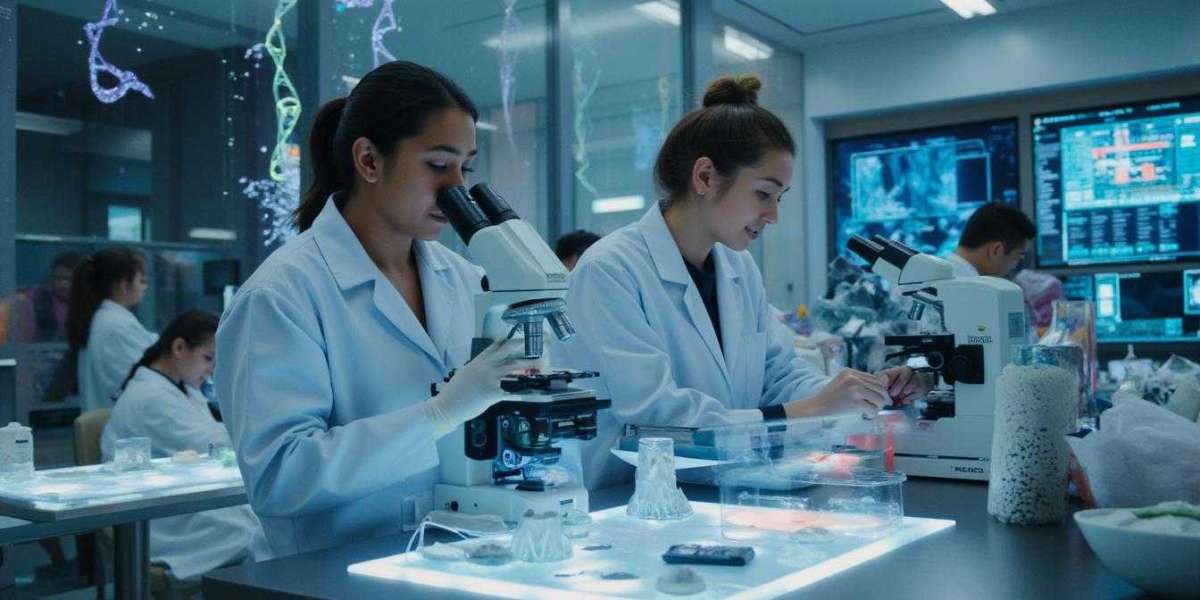Introduction
Biotechnology is a rapidly evolving field that merges biology, technology, and engineering to create innovative solutions in healthcare, agriculture, and environmental management. Modern Biotechnology Engineering Programs are not just limited to laboratory experiments—they increasingly incorporate Artificial Intelligence (AI), machine learning, data analytics, and other cutting-edge technologies.
In this article, we will explore how these programs are transforming education, research, and practical applications for students. We will also examine the opportunities students have at Dr. M.C. Saxena Group of Colleges (MCSGOC) to gain hands-on experience with modern tools and technologies.
1. Overview of Biotechnology Engineering Programs
1.1 Definition and Scope
Biotechnology Engineering Programs combine engineering principles with biological sciences. These programs equip students with skills to work in areas like:
Genetic engineering
Drug development
Environmental biotechnology
Industrial microbiology
1.2 Core Curriculum
The curriculum typically includes:
Molecular biology
Biochemistry
Bioinformatics
Microbiology
Bioprocess engineering
Modern programs, including those at MCSGOC, also integrate courses in AI, robotics, and computational modeling to prepare students for the technology-driven future.
1.3 Career Opportunities
Graduates can work in:
Pharmaceutical companies
Research and development labs
Agricultural biotech firms
Healthcare technology startups
Environmental and sustainability projects
2. Role of AI in Biotechnology Engineering Programs
Artificial Intelligence is revolutionizing the field of biotechnology. Students in modern programs are trained to use AI for predictive analysis, research optimization, and precision medicine.
2.1 AI in Drug Discovery
AI algorithms analyze vast datasets to predict new drug candidates, reducing time and cost significantly. Biotechnology students learn how to:
Use machine learning for molecular modeling
Analyze genetic data with AI tools
Predict drug interactions
2.2 AI in Genomics and Bioinformatics
Genomic data is massive and complex. AI helps students and researchers to:
Identify gene patterns
Detect mutations
Personalize treatments for patients
2.3 AI in Environmental Biotechnology
Biotechnology programs integrate AI to monitor and manage environmental impacts:
Predicting pollution levels
Optimizing bioremediation processes
Modeling ecosystems
3. Integration of Modern Technologies
Apart from AI, modern biotechnology engineering education incorporates several advanced technologies:
3.1 CRISPR and Gene Editing
CRISPR technology allows precise gene editing. Students gain hands-on knowledge in:
Gene modification techniques
Genetic therapy research
Agricultural biotechnology applications
3.2 Bioinformatics Tools
Bioinformatics uses computational tools to analyze biological data. Students learn:
Genome sequencing
Protein structure prediction
Data visualization techniques
3.3 Lab Automation and Robotics
Automated labs reduce human error and improve efficiency. Modern programs teach students:
Robotic handling of samples
High-throughput screening
Automated data collection and analysis
3.4 Internet of Things (IoT) in Biotechnology
IoT devices are used to monitor bioprocesses remotely. Students learn to:
Control fermentation processes
Monitor environmental conditions in labs
Collect real-time data for research
4. How MCSGOC Implements Technology-Driven Learning
At Dr. M.C. Saxena Group of Colleges, Biotechnology Engineering Programs are designed to merge theoretical knowledge with practical skills.
4.1 Smart Classrooms and Digital Labs
Students have access to:
AI-enabled simulations
Online bioinformatics platforms
Virtual labs for gene editing experiments
4.2 Industry Collaborations
MCSGOC collaborates with biotech companies for internships and research projects, allowing students to work on:
AI-driven drug discovery
Genomics research
Sustainable bioprocesses
4.3 Research Opportunities
Students can participate in:
AI and machine learning research for biotechnology
Novel drug discovery projects
Environmental biotechnology studies
5. Benefits of AI and Modern Technologies in Biotechnology Education
5.1 Enhanced Research Capabilities
Students can analyze complex datasets faster and more accurately using AI tools.
5.2 Career Readiness
Exposure to modern tools ensures graduates are prepared for cutting-edge roles in biotech industries.
5.3 Innovation and Problem-Solving
AI and technology integration encourage creativity and new solutions in medicine, agriculture, and environmental management.
6. Challenges in Integrating AI and Modern Technologies
6.1 Data Privacy and Security
Handling sensitive genomic and patient data requires strong cybersecurity measures.
6.2 High Costs
AI software, robotic labs, and advanced tools can be expensive to implement.
6.3 Skill Gap
Students and faculty need continuous training to keep up with evolving technologies.
MCSGOC addresses these challenges through scholarships, industry training, and continuous faculty development programs.
7. Future of Biotechnology Engineering Programs
The future of biotechnology lies at the intersection of biology, AI, and engineering. Key trends include:
Personalized medicine using AI
AI-driven agriculture for sustainable farming
Advanced bio-manufacturing and synthetic biology
Environmental conservation through smart biotech solutions
Students at MCSGOC are trained to adapt to these trends, ensuring they remain industry-ready.
8. Student Testimonials and Success Stories
Many MCSGOC students have successfully:
Developed AI-based diagnostic tools
Published research in gene editing
Participated in international biotech competitions
Their experiences highlight the practical impact of modern Biotechnology Engineering Programs on career growth and innovation.
9. Conclusion
Modern Biotechnology Engineering Programs are no longer limited to traditional lab work. By integrating AI, robotics, IoT, and bioinformatics, students are equipped to lead the future of biotechnology.
Dr. M.C. Saxena Group of Colleges (MCSGOC) ensures that its students gain hands-on experience with the latest technologies, preparing them for dynamic careers in pharmaceuticals, healthcare, agriculture, and environmental biotechnology.
With these advancements, the next generation of biotech engineers is ready to make significant contributions to science, technology, and society.
10. Frequently Asked Questions (FAQ) – Biotechnology Engineering Programs
1. What are Biotechnology Engineering Programs?
Answer:
Biotechnology Engineering Programs are multidisciplinary courses that combine biology, chemistry, and engineering principles. These programs equip students with knowledge and practical skills to work in areas such as genetic engineering, drug development, bioinformatics, and environmental biotechnology. Students also learn modern technologies like AI, robotics, and IoT to solve real-world problems efficiently.
2. How is AI used in Biotechnology Engineering Programs?
Answer:
Artificial Intelligence (AI) is integrated into biotechnology to analyze large biological datasets, predict outcomes, and optimize research. Students use AI for drug discovery, genomics analysis, personalized medicine, and environmental monitoring. This hands-on experience prepares students to implement AI-driven solutions in research and industry projects.
3. Which modern technologies are integrated into biotechnology programs?
Answer:
Modern biotechnology programs include tools and technologies like:
AI and Machine Learning
Bioinformatics software
CRISPR gene-editing technology
Lab automation and robotics
Internet of Things (IoT) for bioprocess monitoring
These technologies enhance research accuracy, efficiency, and innovation.
4. What career opportunities exist for biotechnology graduates?
Answer:
Graduates can pursue careers in:
Pharmaceutical and healthcare industries
Agricultural biotech companies
Environmental management and sustainability firms
Research and development laboratories
AI-driven biotech startups
The integration of AI and modern technologies gives students a competitive edge in emerging biotech fields.
5. How does MCSGOC support technology-driven learning in biotechnology?
Answer:
At Dr. M.C. Saxena Group of Colleges, students have access to:
AI-enabled virtual labs
Digital bioinformatics tools
Robotics and automated lab equipment
Industry collaborations for hands-on projects
Internships in cutting-edge biotech companies
This ensures students gain practical experience with the latest technologies.
6. What is CRISPR, and how is it taught in biotechnology programs?
Answer:
CRISPR is a revolutionary gene-editing tool that allows precise modification of DNA sequences. Biotechnology programs teach students how to design and conduct experiments using CRISPR, explore genetic therapy applications, and develop solutions for agriculture and medicine. MCSGOC provides practical training in a controlled lab environment to understand CRISPR applications safely.
7. How does bioinformatics enhance biotechnology research?
Answer:
Bioinformatics uses computational tools to analyze biological data like DNA sequences, protein structures, and gene expressions. Students learn to:
Perform genome sequencing analysis
Predict protein folding
Visualize complex biological datasets
This helps accelerate research, improve accuracy, and enable data-driven decision-making.
8. What role do robotics and automation play in biotech labs?
Answer:
Robotics and automated lab systems increase precision, reduce human error, and save time. Students learn to use robotic arms for sample handling, high-throughput screening, and automated experiments, allowing them to focus on advanced research and analysis instead of repetitive manual tasks.
9. Can students participate in industry projects during the program?
Answer:
Yes. Biotechnology Engineering Programs at MCSGOC include industry collaborations and internships. Students can work on real-life projects such as AI-driven drug discovery, gene-editing research, and environmental biotechnology applications, gaining hands-on experience and exposure to industry practices.
10. How is IoT applied in biotechnology processes?
Answer:
The Internet of Things (IoT) allows monitoring and controlling bioprocesses remotely. For example:
Sensors track environmental conditions in labs
IoT devices monitor fermentation or cell culture processes
Real-time data collection helps optimize research experiments
This integration helps students understand modern biotech operations and process management.
11. What are the challenges of integrating AI in biotechnology programs?
Answer:
Challenges include:
Managing sensitive genomic and patient data securely
High costs of AI software, robotics, and lab equipment
Continuous training required for students and faculty to stay updated
MCSGOC addresses these by providing proper training, secure labs, and partnerships with tech companies.
12. How can students gain hands-on AI experience at MCSGOC?
Answer:
Students gain hands-on AI experience through:
AI-enabled simulations and virtual labs
Research projects using machine learning for genomics and drug discovery
Collaboration with industry for real-world AI applications in biotechnology
This ensures students graduate with practical knowledge of AI tools in biotech.
13. What is the future of Biotechnology Engineering Programs?
Answer:
The future involves a stronger integration of AI, robotics, and computational tools. Students will work on personalized medicine, sustainable agriculture, environmental solutions, and synthetic biology. Programs at MCSGOC are designed to prepare graduates to meet future industry demands and technological advancements.
14. How do AI and modern technologies improve research efficiency?
Answer:
AI automates data analysis, predicts outcomes, and identifies patterns that humans might miss. Modern technologies like robotics, bioinformatics, and IoT reduce errors, speed up experiments, and allow precise monitoring. This results in faster, accurate, and cost-effective research.
15. Are there scholarships for students pursuing Biotechnology Programs at MCSGOC?
Answer:
Yes. MCSGOC offers scholarships and financial aid for meritorious students and those pursuing Biotechnology Engineering Programs. These scholarships help students access advanced technologies, training, and research opportunities without financial barriers.



